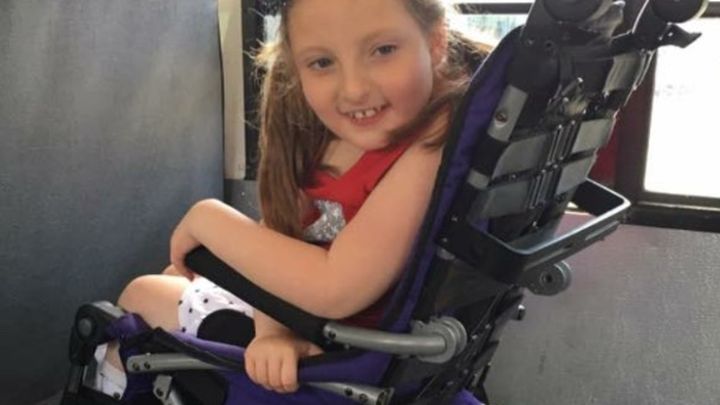
A Bike for Val
Donation protected
A Bike for Val
This campaign is started in hopes
of getting Valentina a special needs Tandem Bicycle by her birthday April 12, 2017
Valentina is a 9yr old soon to be 10 twin
struggling with restrictions of Rett Syndrome.
Rett Syndrome is an incurable, rare, severe neurological disorder that affects mostly girls. It's usually discovered in the first two years of life, and a child's diagnosis with Rett syndrome can feel overwhelming. Although there's no cure, early identification and treatment may help girls and families who are affected by Rett syndrome. In the past, it was felt to be part of the Autism Spectrum Disorder. We now know that it is mostly genetically based. Although Rett syndrome is genetic, children almost never inherit the faulty gene from their parents. Rather, it’s a chance mutation that happens in DNA.
Because Rett syndrome is rare, doctors will first rule out other conditions, including autism spectrum disorder, cerebral palsy, metabolic disorders, and prenatal brain disorders. Rett is seemingly a combination of all these combined.
Symptoms of Rett syndrome:
Slowed growth. The brain doesn’t grow properly, and the head is usually small (doctors call this microcephaly). This stunted growth becomes clearer as the child gets older.
Problems with hand movements. Most children with Rett syndrome lose the use of their hands. They tend to wring or rub their hands together.
No language skills. Between ages 1 to 4, social and language skills start to decline. Children with Rett syndrome stop talking and can have extreme social anxiety. They may stay away from or not be interested in other people, toys, and their surroundings.
Problems with muscles and coordination. This can make walking awkward.
Trouble with breathing. A child with Rett may have uncoordinated breathing and seizures, including very fast breathing (hyperventilation), forceful exhaling of air or saliva, and swallowing air.
Children with Rett syndrome also tend to become tense and irritable as they get older. They may cry or scream for long periods of time, or have long fits of laughter.
Symptoms of Rett syndrome usually don’t improve over time. It’s a lifelong condition. Often, the symptoms worsen very slowly, or don’t change. It’s rare for people with Rett syndrome to be able to live independently.
Any additional funds raised will be used to purchase her twin sister Isabella a bicycle and
And Valentina's everyday needs
please visit
https://m.facebook.com/rettsyndromeValentina/
This campaign is started in hopes
of getting Valentina a special needs Tandem Bicycle by her birthday April 12, 2017
Valentina is a 9yr old soon to be 10 twin
struggling with restrictions of Rett Syndrome.
Rett Syndrome is an incurable, rare, severe neurological disorder that affects mostly girls. It's usually discovered in the first two years of life, and a child's diagnosis with Rett syndrome can feel overwhelming. Although there's no cure, early identification and treatment may help girls and families who are affected by Rett syndrome. In the past, it was felt to be part of the Autism Spectrum Disorder. We now know that it is mostly genetically based. Although Rett syndrome is genetic, children almost never inherit the faulty gene from their parents. Rather, it’s a chance mutation that happens in DNA.
Because Rett syndrome is rare, doctors will first rule out other conditions, including autism spectrum disorder, cerebral palsy, metabolic disorders, and prenatal brain disorders. Rett is seemingly a combination of all these combined.
Symptoms of Rett syndrome:
Slowed growth. The brain doesn’t grow properly, and the head is usually small (doctors call this microcephaly). This stunted growth becomes clearer as the child gets older.
Problems with hand movements. Most children with Rett syndrome lose the use of their hands. They tend to wring or rub their hands together.
No language skills. Between ages 1 to 4, social and language skills start to decline. Children with Rett syndrome stop talking and can have extreme social anxiety. They may stay away from or not be interested in other people, toys, and their surroundings.
Problems with muscles and coordination. This can make walking awkward.
Trouble with breathing. A child with Rett may have uncoordinated breathing and seizures, including very fast breathing (hyperventilation), forceful exhaling of air or saliva, and swallowing air.
Children with Rett syndrome also tend to become tense and irritable as they get older. They may cry or scream for long periods of time, or have long fits of laughter.
Symptoms of Rett syndrome usually don’t improve over time. It’s a lifelong condition. Often, the symptoms worsen very slowly, or don’t change. It’s rare for people with Rett syndrome to be able to live independently.
Any additional funds raised will be used to purchase her twin sister Isabella a bicycle and
And Valentina's everyday needs
please visit
https://m.facebook.com/rettsyndromeValentina/
Organizer and beneficiary
Kim Cooks
Organizer
Staten Island, NY
Raquel Priolo
Beneficiary